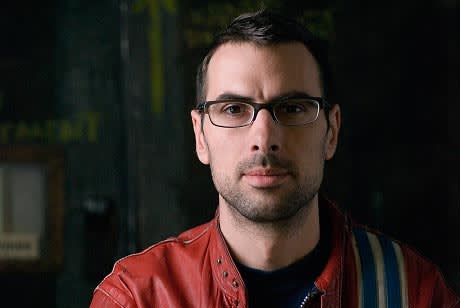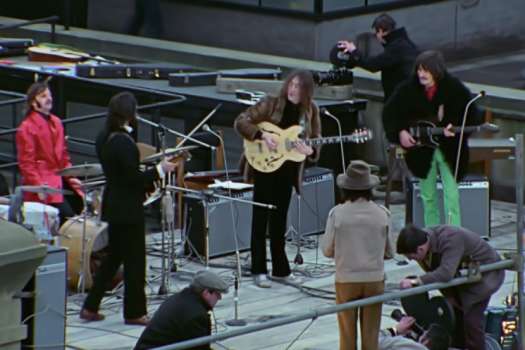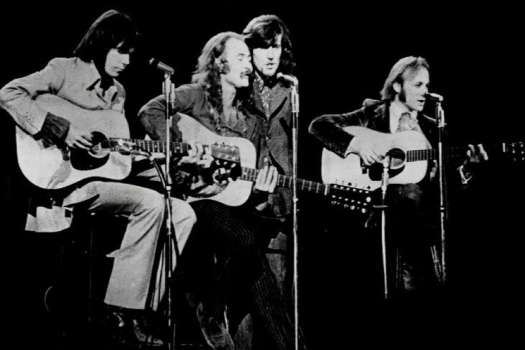DJ Champion cant go anywhere without his laptop. The 36-year-old from Montreal is sitting in a hotel room in France, waiting to take his portable Mac to a ten p.m. gig in Saint-Lo, France, a small town about four hours east of Paris. In the meantime though, hes using the internet to translate words from his native tongue to English.
"Marginale, he says at the end of a sentence, in a thick French accent. "Hold on a second. Theres a long, silent pause on the phone, save for a few muffled beeps from the laptop. "Freak! he yells out, laughing. "Its says freak, but thats not it! A few more quick taps and finally he finds the word hes looking for. "Borderline, he says proudly.
Champion, aka Maxime Morin, is trying to articulate where he fits in the larger music landscape. His 2004 release, Chill Em Out, combines loud, rock guitars with electronic beats, creating a curious rave-meets-rock club vibe. So, pegging what aisle of the music store his record should be in is difficult. If Morin had his way, hed be placed in an ambiguous space right near the pop section, but not far from the electronica department. Hence the word "borderline. "Im not a pop artist yet, he says, then reveals that his next album could be "extremely pop, but only if it sounds good.
The two sides of Champion his rocknroll self and his beat making electro half only recently merged. For years the artist was an axe-wielding rocker, playing in various bands and diligently practicing the solo from Van Halens "Eruption. In 1993, the musician discovered dance music, and there went his love affair with the guitar. For eight years Morin wrote and produced electonica, but it was his day job and 9/11 that forced him to revisit his forgotten first love.
Around the time terrorists attacked New York and Washington, Morin was writing music for commercials and movies. His best-known project was engineering the Triplets of Belleville soundtrack, which not only helped earn the movie an Oscar nomination (for best song) but also gave Morin a chance to play at the awards show. Back then he was raking in the cash and new projects were coming at him all the time, but when the twin towers fell he knew he had to make a change. "All Im doing is making money, and here the world is fucked up, he says.
Instead of staying in his lucrative job, he sold his part of the studio he owned and decided to make music for himself. "I came to the point I was fed up of having to deliver something to someone, he explains. "Even when I tried to be me, artistically speaking, I got to the point where I was like fuck it all. I was really empty.
But selling his studio would plunge the musician into dire financial straits, as he had to pay off a bunch of debts himself. "I was in total shit, he says. "I was never so poor, besides when I was 18 years old. Fortunately, Morin took the "money cant buy happiness adage close to heart. "The money issue, it was rough times, but in my personal life it was a wonderful time.
The lack of steady income didnt stifle Champion. He knew it was time to write the album hed always wanted to, but what would that record sound like? As he pondered that question, he found himself wondering what his old guitar would sound like after ten years of neglect. "When I rediscovered it, it was so refreshing, and so simple, he says like a kid discovering his favourite instrument for the first time. "I put my fingers on it listening to the vibrations of the guitar, and wow that makes me feel good. He already knew that he got off on making dance music, so combining the two things that, as he says, "made me feel good, was only natural.
Now, with his guitar and laptop in hand, Champion was ready to create what would become Chill Em Out. At first, the album sounds like a typical electronica disc lots of loops, delay, atmospherics and dance beats but a closer listen will reveal that not a single keyboard was used in making the disc. Only layers upon layers of guitars, and some computer generated drums. "I like the raw sound of a guitar, he says, explaining why he didnt use synths or even too many guitar effects. "When youre doing electronic music youre always looking for a new sound or a new way of doing things, but the beauty of a guitar is when you take it on your knees, a guitar sounds like a guitar.
Because of his passion for rock and dance, theres a little something for everyone on Chill Em Out. Zeppelin fans will dig the crunchy riffs on "Heaven On, while electro purists should be satisfied with the spacey, minimal guitar loops on "The Plow. Throw in the booming, bluesy voice of Betty Bonifassi (the French Canadian songstress who sang on the The Triplets of Belleville soundtrack) and R&B aficionados will be clamouring to buy his disc too. If all this variety isnt enough, Champion recently put out a remix album, which reinterprets a few Chill Em Out tracks. So far, it looks like Champions music is finding its way into a variety of music collections. After selling out Chill Em Outs initial 3,000 copies, the records gone on to sell 50,000 units worldwide. Add to that a Juno nomination, a few awards and a spot on the Virgin Festival, and it looks like Morins decision to ditch his riches and return to his guitar playing roots was a good one. And, fortunately for Morin, hes done wondering whether or not quitting his lucrative job was the right thing to do. "I have no regrets, he says. "Sometimes you struggle looking around for new ways of doing things, but the answer is always so simple. Its so close to you that you cant see it.
"Marginale, he says at the end of a sentence, in a thick French accent. "Hold on a second. Theres a long, silent pause on the phone, save for a few muffled beeps from the laptop. "Freak! he yells out, laughing. "Its says freak, but thats not it! A few more quick taps and finally he finds the word hes looking for. "Borderline, he says proudly.
Champion, aka Maxime Morin, is trying to articulate where he fits in the larger music landscape. His 2004 release, Chill Em Out, combines loud, rock guitars with electronic beats, creating a curious rave-meets-rock club vibe. So, pegging what aisle of the music store his record should be in is difficult. If Morin had his way, hed be placed in an ambiguous space right near the pop section, but not far from the electronica department. Hence the word "borderline. "Im not a pop artist yet, he says, then reveals that his next album could be "extremely pop, but only if it sounds good.
The two sides of Champion his rocknroll self and his beat making electro half only recently merged. For years the artist was an axe-wielding rocker, playing in various bands and diligently practicing the solo from Van Halens "Eruption. In 1993, the musician discovered dance music, and there went his love affair with the guitar. For eight years Morin wrote and produced electonica, but it was his day job and 9/11 that forced him to revisit his forgotten first love.
Around the time terrorists attacked New York and Washington, Morin was writing music for commercials and movies. His best-known project was engineering the Triplets of Belleville soundtrack, which not only helped earn the movie an Oscar nomination (for best song) but also gave Morin a chance to play at the awards show. Back then he was raking in the cash and new projects were coming at him all the time, but when the twin towers fell he knew he had to make a change. "All Im doing is making money, and here the world is fucked up, he says.
Instead of staying in his lucrative job, he sold his part of the studio he owned and decided to make music for himself. "I came to the point I was fed up of having to deliver something to someone, he explains. "Even when I tried to be me, artistically speaking, I got to the point where I was like fuck it all. I was really empty.
But selling his studio would plunge the musician into dire financial straits, as he had to pay off a bunch of debts himself. "I was in total shit, he says. "I was never so poor, besides when I was 18 years old. Fortunately, Morin took the "money cant buy happiness adage close to heart. "The money issue, it was rough times, but in my personal life it was a wonderful time.
The lack of steady income didnt stifle Champion. He knew it was time to write the album hed always wanted to, but what would that record sound like? As he pondered that question, he found himself wondering what his old guitar would sound like after ten years of neglect. "When I rediscovered it, it was so refreshing, and so simple, he says like a kid discovering his favourite instrument for the first time. "I put my fingers on it listening to the vibrations of the guitar, and wow that makes me feel good. He already knew that he got off on making dance music, so combining the two things that, as he says, "made me feel good, was only natural.
Now, with his guitar and laptop in hand, Champion was ready to create what would become Chill Em Out. At first, the album sounds like a typical electronica disc lots of loops, delay, atmospherics and dance beats but a closer listen will reveal that not a single keyboard was used in making the disc. Only layers upon layers of guitars, and some computer generated drums. "I like the raw sound of a guitar, he says, explaining why he didnt use synths or even too many guitar effects. "When youre doing electronic music youre always looking for a new sound or a new way of doing things, but the beauty of a guitar is when you take it on your knees, a guitar sounds like a guitar.
Because of his passion for rock and dance, theres a little something for everyone on Chill Em Out. Zeppelin fans will dig the crunchy riffs on "Heaven On, while electro purists should be satisfied with the spacey, minimal guitar loops on "The Plow. Throw in the booming, bluesy voice of Betty Bonifassi (the French Canadian songstress who sang on the The Triplets of Belleville soundtrack) and R&B aficionados will be clamouring to buy his disc too. If all this variety isnt enough, Champion recently put out a remix album, which reinterprets a few Chill Em Out tracks. So far, it looks like Champions music is finding its way into a variety of music collections. After selling out Chill Em Outs initial 3,000 copies, the records gone on to sell 50,000 units worldwide. Add to that a Juno nomination, a few awards and a spot on the Virgin Festival, and it looks like Morins decision to ditch his riches and return to his guitar playing roots was a good one. And, fortunately for Morin, hes done wondering whether or not quitting his lucrative job was the right thing to do. "I have no regrets, he says. "Sometimes you struggle looking around for new ways of doing things, but the answer is always so simple. Its so close to you that you cant see it.




